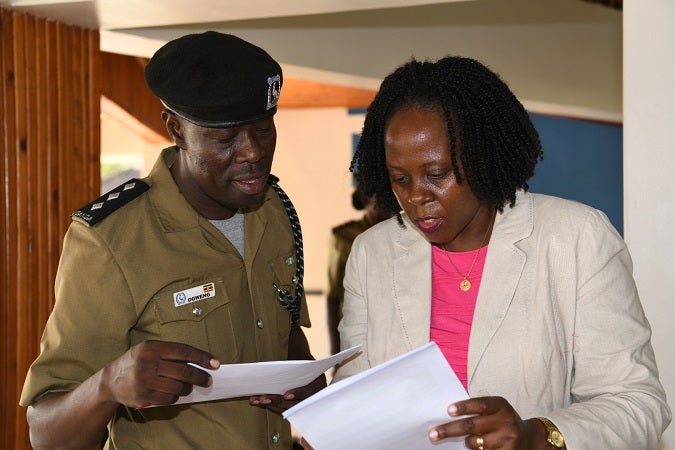Take five: 'increased domestic violence cases continue to leave me puzzled as to why people fail to live with peacefully with their families'
Francis Ogweng (Assistant Superintendent of Police) is Child & Family Protection Officer and a He For She advocate in Uganda. Despite the new challenges posed by the current lockdown to curb the spread of the coronavirus, this husband and father continues to conduct his police work with the safety of women in mind.Date:

Francis Ogweng and UN Women EVAW Programme Specialist Beatrice Mulindwa at the Positive Masculinity Dialogue in March 2020 . Photo: UN Women/ Eva Sibanda
1. How has the current context of COVID-19 changed your work/daily life?
Police work is mainly conducted through physical interaction with clients, but with Covid-19 restrictions all physical meetings are suspended. I mediate cases through teleconference but sometimes neither I nor the clients that I serve can afford the cost data. My community engagement work on violence against women has paused. As an office, we have suspended all field activities that require mobilizing and physically meeting people. Our organizational work style has completely changed and as yet it does not favour the nature of police work.
2. Can you give me an example of the challenges you face?
I want to go on radio and television to sensitize on violence against women during lockdown, but I cannot due to lack of adequate transport means. Tracing and inviting accused persons for office mediation is also a challenge because they use the lockdown as an excuse not to report. Other challenges are lack of money, smart phones, knowledge of online meetings, redundancy which causes depression or stress and inability of men to adequately provide for the family.
3. In your view, what is the hardest thing about being a man that advocates for women?
Finding platforms for advocacy is the hardest thing for me now that physical meetings have been banned. Dismantling the patriarchal culture of men is not easy as this is their comfort zone. To date many people make fun of me, they call me names, they think I am not a real man – but I don’t care, nothing they say discourages me.
4. How has COVID19 lockdown impacted your family?
I have found time to engage with my family, we have meetings and as parents we are learning from our children. We are also however faced with the fear of the unknown.
5. How can young men in Uganda be HeForShe advocates at home? And why is this their involvement crucial?
This is the time for every man in Uganda to step up at home, but unfortunately a culture of quarreling persists, along with poor communication, patriarchal authoritative rule and what we call in police terms ‘command and control’. I have created a ‘role model men’ WhatsApp platform but only members with smart phones are active, many of our members are inactive because they do not have smart phones or cannot afford the cost of data.
Young men can also assist with house chores such as cooking, cleaning, helping children to learn, watching educative programs together, playing and praying together to lessen domestic burdens on women.